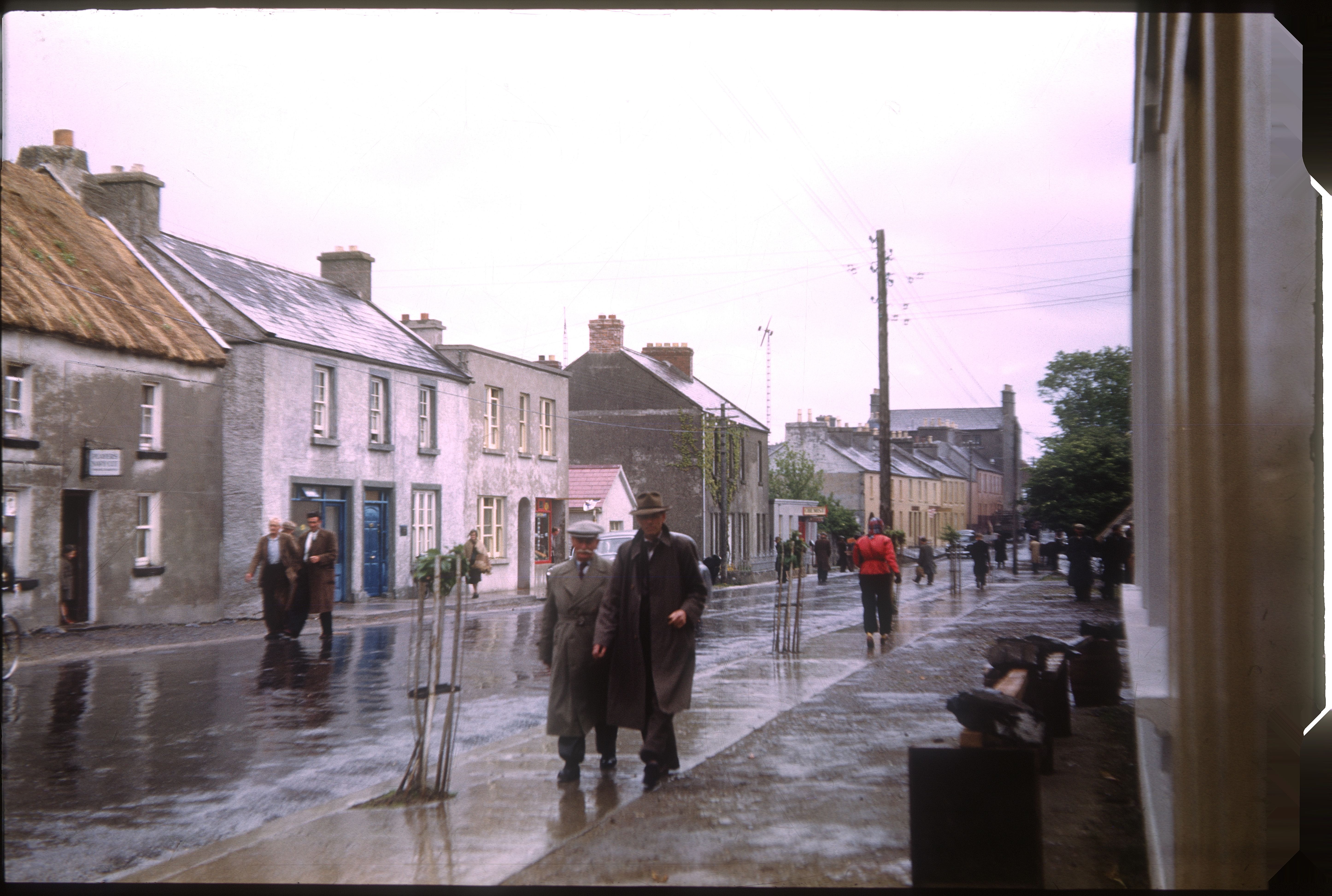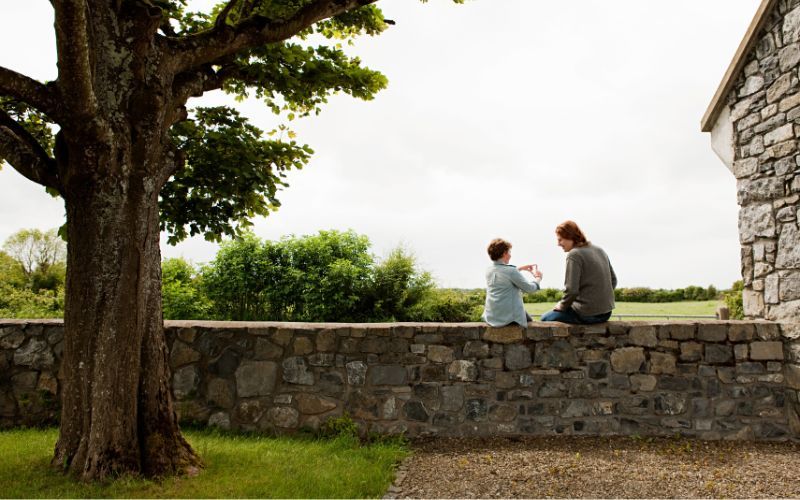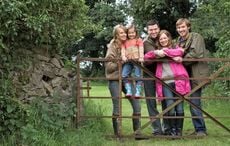If you are searching for family Irish roots, it’s likely you’ll become part historian, storyteller, and mostly a detective of family antiquities.
My late father, Martin J. Walsh Jr. of Murdock, Minnesota, captured images with his 35mm camera and Kodachrome slide film, including a group of tourists searching for shamrocks in County Kildare, Ireland, in 1953. This collection of images is now part of my family’s heritage and a way to connect to Irish culture.
He was searching for hints of our family’s origins during his travels. There are incredible resources available today from the comfort of home and a computer that my father could have never imagined.
It doesn’t matter if you have been searching for years for the origins of your family, or just starting, there’s always room for a few new pointers. There were many resources I was not aware of when I really put my genealogy search into full swing around 2010. I curated a free listing of about 100 resources to help with searching, called the Irish Genealogy Toolkit, on my website, as a result of my genealogy search.
Since the start of my quest to find Irish roots, many church documents from Ireland are now available to search for free online, along with a multitude of other resources. Below are ten pointers and resources to help launch a family history project today.

Photo by the late Martin J. Walsh Jr., of Murdock Minnesota, Kodachrome slide. Information written on slide: A small village near Galway. May 14, 1953. Photo provided Paul M. Walsh, son of photographer.
1. Getting started with genealogy, church documents
It’s an overwhelming task to get started discovering family roots, as you will, without knowing, become a historian, storyteller, and, most importantly, a detective searching for any artifacts ancestors left behind decades or hundreds of years ago.
- Home and family, starting point – The best place to start is to inquire and gather any genealogy work that’s been done previously at home and with your family. You might be amazed, or disappointed, but significant work has already been done. If you can’t find any previous work, you might be just the person your family needs and is calling to become the storyteller for your clan.
- Personal family search – Read an overview about how I launched my family Irish research on my website or here on IrishCentral.
- Video, National Archives, Ireland – Watch informative videos on YouTube about Irish genealogy and documents from professional genealogist Nicola Morris at the National Archives, Dublin, Ireland. Hear it from a professional on starting an Irish genealogy search. If interested, view more videos on the National Archives of Ireland YouTube channel.
-
Guide, workbook – The National Archives of Ireland created a website and a workbook in 2016, geared toward schoolchildren to learn about family history. After reviewing the resources, I found many of the items apply to just about anyone with little to no knowledge of Ireland and searching for genealogy, meaning most people starting a search for Irish roots. View the 2016 Family History website, and download a free workbook.
- Irish Civil and Church documents: Roman Catholic, Church of Ireland, Presbyterian – Irish church and civil records from the Department of Culture, Heritage and the Gaeltacht, Ireland, official Irish website, are available to search at no cost. As of March 1, 2022, more historical births, marriages, and deaths were added to the collection by the General Register Office of Ireland. There is no cost to use the website resources. Read more on the additional civil records at IrishGenealogy.ie.
- Understand Irish Emigration, an overview – Read Irish Emigration History by Irial Glynn, 2012, posted at the University College Cork, Ireland, website.
2. Patience, and a lot of it
Trying to find your family history might not happen overnight. Starting a genealogy search can be exciting and exhausting at the same time. I would find bits and pieces that connected to other bits and pieces, and sometimes not a connection at all. It’s a great task to undertake, but the results can be rewarding.
I was propelled to find the origins of my family in Ireland, as best I could, and I achieved my goal after about 10 years. My real search started decades before, when I was in college in the 1980s, typing term papers on an electric typewriter. We are living in an incredible time to connect the past with the present due to technology.
3. Start research at home, not in Ireland
If you are thinking of flying to Ireland to start your family search, please think again. There are incredible resources to start searching now, before going to the island of Ireland. Think of ways of putting together your story the best you can with names and dates of ancestors, cities, townlands, counties, and any details you can find before even packing your luggage, and selecting sturdy walking shoes.
If you need help with research, hiring a professional genealogist is always an option. There are many resources for genealogists, but when it comes to qualifications from professional agencies, there are no guarantees. I’ve included several organizations to review for hiring a generalist, see the heading of Professional genealogists, resources, code of ethics, at the Irish Genealogy Toolkit.
A word to the wise: make sure you understand exactly what you are paying for before hiring a genealogist. Susan Riley, Ph.D., a genealogist from Minnesota, notes it’s important to determine the genealogist’s credentials and experience; ask for work samples; insist on a written contract establishing goals, price of research, timetable; meet using video conferencing, such as Zoom, to clarify everything; and start a small, inexpensive project to see if the geologist is reliable.
4. Keep a notebook at hand
It’s important to keep a notebook dedicated to your search. Yes, a notebook! Write with an archival-quality pen and a sturdy notebook that's easy to transport in your pocket, purse, or backpack. Take notes on the people you meet and the details you find. When your computer crashes, you will have notes to look at in the future, and it will be something your descendants can use to uncover future details. I have several notebooks from my search and travel, and access to family documents, such as letters, diaries, and notebooks. Check to see what’s available within your family.
5. Genealogy guides, tools
There are numerous genealogy guides available online, but look for credible sources. If you must pay to read a listing of tips and pointers, move on. The National Archives in Washington, DC, has numerous resources for genealogy, including articles, finding aids, webinars, and other information. View Genealogy Resources and Reference Reports for Genealogy online at the National Archives.
- Ask Genealogy Questions on History Hub, National Archives
- National Archives Catalog Guide for Genealogists and Family Historians
- Online Research tools at the National Archives
6. Military, vital statistics, obituaries, graves, and cemeteries
Your dearly departed relatives and their details will help you achieve your goal of putting together a family history. It’s your task to find out what’s available.
I’ve spent a lot of time visiting cemeteries looking for the graves of my family in the United States and Ireland. I’ve accidentally found living relatives at cemeteries walking rows of graves searching for details on our family I didn’t know existed. Don’t be shy to spend hours walking in cemeteries with other people visiting cemeteries, as you might be relatives.
- Find a Grave website, worldwide
- Find a military grave, U.S. Department of Veterans Affairs
- Military records, National Archives
- Library Spot, find obituaries and cemeteries
- Where to write for Vital Records in the US, National Center for Health Statistics
7. Newspapers and archives
Old newspapers are a great source to search for anything written about your family in the past. I found my family mentioned in numerous old newspaper stories when searching at my local historical society in Benson, Minnesota, Swift County Historical Society and Museum.
- Newspapers at Ancestry, paid subscription, but very helpful resource
- Listing of state archives at National Archives
- Go local – Consider inquiring at local city and county libraries and museums about available resources for genealogy, including old newspapers.
8. Subscription, non-subscription genealogy-related search websites, social media
Check with local libraries, historical societies, and museums if they offer free access to Ancestry and other paid subscriptions for searching for genealogy. You might already have access in your city, county, or state as part of public services and resources.
- Ancestry, paid subscription, with free resources to read online
- FamilySearch, paid subscription, with free resources
- Non-Subscription Databases, National Archives
- Search Facebook groups and other social media related to specific areas or counties in Ireland and topics. There is an official Facebook page Ireland Family History, hosted by Tourism of Ireland, sharing tips and trivia to help find Irish family history.
9. Travel to Ireland
If you are ready to travel to Ireland, consider Ireland’s official tourism website, Ireland.com, with free resources related to maps, brochures, trip planning and more.
-
Irish travel brochures and maps
10. Nonprofit, Ireland Reaching Out (Ireland XO)
There is a nonprofit organization helping welcome home Irish living in the Irish diaspora, people with ancestral roots to Ireland. I’ve not used this agency, but their resources are intriguing. Consider learning about Ireland Reaching Out (Ireland XO), a volunteer-based, non-profit initiative that builds vibrant, lasting links between the global Irish Diaspora and parishes of origin in Ireland.
Bonus bit of departing advice
Make time to get your genealogy detective work afoot. Best wishes in your search to reconnect with your family roots!
A full listing can be genealogy resources can be found Irish Genealogy Toolkit found at JannetWalsh.com.
Jannet L. Walsh, of Murdock, Minnesota, is a photographer, writer, and educator. She is the author of the forthcoming creative nonfiction quest narrative "Higgledy-Piggledy Stones: Family Stories from Ireland and Minnesota," scheduled for publication in 2023 by Shanti Arts Publishing. Follow Walsh on Facebook, Twitter, and her website.
* Originally published in 2022 and updated in January 2026.
This article was submitted to the IrishCentral contributors network by a member of the global Irish community. To become an IrishCentral contributor click here.




Comments